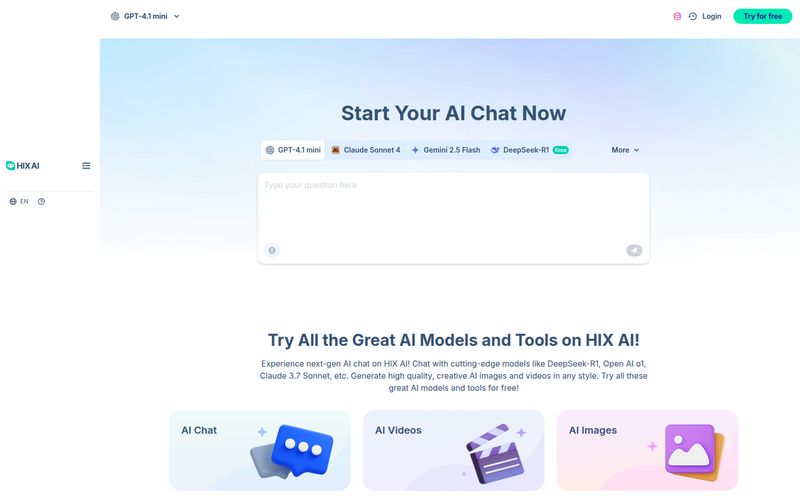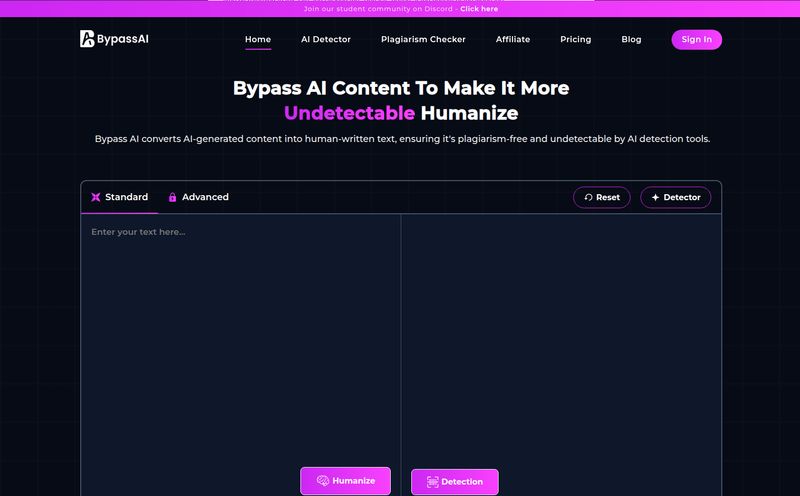Academic writing is a grind. A glorious, knowledge-expanding grind, sure, but a grind nonetheless. I can still feel the phantom pain of my grad school days—staring at a blinking cursor, fueled by questionable coffee, trying to make my literature review sound less like a book report and more like a groundbreaking synthesis of human thought. The pressure is immense.
So, whenever a new tool pops up promising to ease that burden, my ears perk up. I've seen dozens of AI writers, but most are built for marketers, bloggers (hello!), or generalists. They don't quite get the specific, painful nuance of academic work. Then, I stumbled across AcademicGPT on Product Hunt, and the name alone made me stop scrolling. A GPT, but for academics? Okay, you have my attention.
So, What Exactly is AcademicGPT?
On the surface, it’s an AI-powered tool designed to be a researcher's sidekick. It’s not trying to be a one-stop-shop for all your writing needs. Instead, it focuses on three core pillars of the academic process: writing assistance, getting feedback, and clarifying complex ideas. Think of it less as a ghostwriter and more as a very, very patient research assistant who never needs a coffee break.
The entire premise is built around interacting with your own research. You upload a paper, and then you tell the AI what you need. It’s a beautifully simple concept that could save hours of agonizing work. Or, it could be another overhyped tool. I had to see for myself.
First Impressions and The User Interface
Landing on the AcademicGPT page is… clean. Almost shockingly so. There are no flashy graphics, no confusing menus. Just a big box that says, "Drop research paper here or click to select." Simple. Direct. I like it.
Below that, you have your three main choices: Write, Feedback, or Explain. It’s a what-you-see-is-what-you-get situation, which is a breath of fresh air in a world of feature-bloated software. It feels like the developers understand their audience: busy, stressed-out academics who don't have time to learn a complicated new system. They just want to get the work done.

Visit AcademicGPT
A Closer Look at The Core Features
This is where the rubber meets the road. A slick interface is nice, but can it actually perform the tasks it promises? Let's break down those three options.
Can It Really Write Your Paper?
Okay, let's manage expectations. It's not going to write your entire dissertation for you (and you wouldn't want it to, right? That’s a whole ethical can of worms). From the dropdown menu, you can select specific sections of a paper for the AI to write: Abstract, Introduction, Methodology, etc. This is smart. It positions the tool as a way to overcome writer's block or generate a solid first draft of a tricky section.
I can see this being a lifesaver for writing abstracts. Condensing 10,000 words of dense research into a crisp, 250-word summary is an art form, and one I’ve never mastered. Having an AI take the first stab at it? Yes, please. This could be an incredible way to get the ball rolling, giving you something to react to and edit rather than starting from that dreaded blank page.
Getting Honest AI Feedback
The "Feedback" option is perhaps the most intriguing. Getting timely, constructive criticism is one of the biggest bottlenecks in academia. Your advisor is busy, your peers are swamped with their own work. Waiting weeks for feedback can completely kill your momentum.
AcademicGPT proposes an instant alternative. While the site is a bit vague on the type of feedback it provides—is it checking for grammatical errors, logical flow, argument strength, or clarity?—the potential is enormous. Imagine uploading a draft and getting instant notes on where your argument is weak or where your language is convoluted. Even if the feedback is 80% as good as a human's, getting it in 30 seconds instead of two weeks is a massive win for productivity.
Explaining the Unexplainable
This is the feature I wish I had back in school. The "Explain" function is designed to take complex concepts from a paper and break them down for you. Anyone who has tried to read a foundational text from a field outside their own knows this struggle. You spend an hour on a single paragraph, drowning in jargon.
Having an AI that can provide a quick summary or define a key term without you having to open 15 new browser tabs could be revolutionary for literature reviews and interdisciplinary work. It lowers the barrier to entry for understanding difficult material, which is something the academic world desperately needs.
The Elephant in the Room: Pricing and Details
Here's my biggest question mark. As of right now, there's no pricing information on the site. Is it free during a beta phase? Will it be a subscription model? A pay-per-use system? For its target audience—students and researchers who aren't exactly rolling in cash—this is a critical detail. The developer's email is listed for feedback, which suggests it’s in a very early stage. My guess is they're gathering user data before rolling out a formal plan.
The only other listed "con" is that it requires JavaScript to run, which, let's be honest, is a non-issue for pretty much everyone in 2024. It’s like saying a car requires gasoline to run. It's just how the web works now.
My Honest Take: The Good and The Questionable
So, what’s the verdict? I'm cautiously optimistic. The biggest pro of AcademicGPT is its laser focus. It knows who it's for and what problems it's trying to solve. The simple interface and the three-pronged approach of Write, Feedback, and Explain is brilliant. It’s a tool built for a specific workflow, and it doesn't get distracted by bells and whistles. It's a scalpel, not a Swiss Army knife.
The main drawback is the lack of information. It's a bit of a black box. What large language model is it running on? How good is the critique? What are the limitations on paper length or complexity? These unknowns make it hard to fully endorse right now, but they also make it exciting. It’s a project to watch.
Who Is This AI Tool Really For?
I see this being a godsend for a few specific groups. Graduate students are the obvious one. They are often working in isolation and are new to the rigorous demands of academic publishing. This could be their secret weapon. Early-career researchers trying to juggle teaching, grant writing, and publishing could also benefit hugely from the efficiency gains. Even non-native English speakers might find the writing and feedback features incredibly helpful for polishing their work to a high standard.
It’s not for the Luddite professor who still writes longhand, and it's not for the marketer trying to churn out blog posts. It’s for the modern academic who understands that technology, when used thoughtfully, can enhance their work rather than detract from it.
A Promising AI Sparring Partner for Researchers
In the end, AcademicGPT feels like a promising start. It’s not going to do the hard work of thinking for you—and it shouldn't. The critical analysis, the novel ideas, the years of research—that’s still all on you. But it could be an invaluable partner in the process of writing. It can help you get your ideas onto the page more clearly and quickly, and in the world of 'publish or perish,' that's no small thing.
I'm genuinely excited to see how this tool develops. With a bit more transparency and some proven results, it could easily become an indispensable part of the modern researcher's toolkit. Anything that helps reduce the friction between a great idea and a published paper is a win in my book.
Frequently Asked Questions
- What is AcademicGPT?
- AcademicGPT is a specialized AI tool designed to help researchers and students with academic writing. It offers three main functions: generating drafts of specific paper sections, providing feedback on your writing, and explaining complex concepts from research papers.
- Is AcademicGPT free to use?
- Currently, there is no pricing information available on the website. This might mean it's in a free beta phase. The developer encourages feedback, suggesting it's an early-stage product, and a pricing model may be introduced later.
- Can AcademicGPT write my entire research paper?
- No, and it's not designed to. It helps you write specific sections like the abstract, introduction, or methodology. The goal is to assist your writing process and help you overcome writer's block, not to replace the critical work of research and authorship. Academic integrity is still paramount.
- How does the 'Feedback' feature work?
- You can upload your paper and select the feedback option. While the site doesn't specify the exact criteria, it's presumed the AI analyzes your text for clarity, structure, and potentially grammatical correctness, providing you with suggestions for improvement much faster than a human peer reviewer.
- Is it ethical to use AI like AcademicGPT for academic work?
- This is a major discussion in academia. Using AI to generate a first draft of a section, check your grammer, or clarify a concept is generally seen as a tool, similar to using a grammar checker or citation manager. However, submitting AI-generated text as your own original work without significant editing and intellectual contribution would likely be considered academic misconduct. Always check your institution's specific policies.
- Who is behind AcademicGPT?
- The tool appears to be an independent project. The contact email provided on the site is for a developer named Lukas, and the tool has a presence on Product Hunt, a platform for showcasing new tech products.
Reference and Sources
- The main tool can be found at the official AcademicGPT website (a direct link isn't provided, but it can be found through search).
- Check out the AcademicGPT page on Product Hunt to see user comments and support.
- For more on the broader topic, Nature has a good article on how scientists are using AI tools like ChatGPT: How ChatGPT is being used in research.



